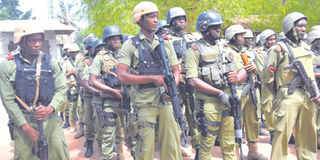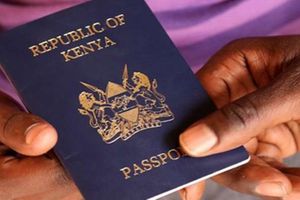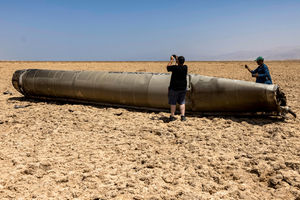Security and development: a case of growing restlessness in rufiji - kibiti - kilwa area

Coast Region Police Officers listen the Minister for Home Affairs, Mwigulu Nchemba during a recent tour of Kibiti District that is one of the areas affected by the ongoing mysterious killings of local leaders in the Coast Region. PHOTO | FILE
What you need to know:
- It is not my intention to dwell on this, it is not constructive but rather to deal on analysis of national security paradigm, where in my opinion we have gone wrong and how to readdress it.
There is growing concern in Tanzania on the security situation in Mkuranga-Kibiti-Rufiji area in Coast as well as Kilwa district in Lindi region. The situation now has led as expected to creation of Special Police Region as well as political mistrusts as grassroots leaders and CCM leaders became victims and targets to be killed. It is not my intention to dwell on this, it is not constructive but rather to deal on analysis of national security paradigm, where in my opinion we have gone wrong and how to readdress it.
My starting point is that security problem is one among generalized problem characteristic of our nation, Tanzania, symptomatic of a greater problem in national interests and national security to the greater people or the majority and the lack of a well-designed – holistic, inter agency based contemporary (match with current times) national security strategy and policy at national level (and regions and district based security strategies).
The strategy must be up to time and conceptualization of current security issues and problems, state security, human security, national security and global security taking consideration that actors of security are multifaceted from state to non-state, private and individual actors and therefore the role of national and state security has become more complex, more demanding that needs more patriotism and national commitment and more focus of people centred security. This is the gap I want to highlight, it quite serious to national security and it has led to lack of patriotism we see today of government and state actors and agencies well expressed on May 24 by President John Magufuli when receiving the report on the probe on mineral concentrate, many of the findings were expectedly unpatriotic, out of national interest and that organs/agencies expected to deal with national security issues did not discharge their duties, and the President sacked the energy and minerals minister Sospeter Muhongo. This is a total threat to national security and indeed state and national people disregard to national security.
Where did we go wrong? We need a clear change of conception and paradigm of national security, national interests in line with contemporary wave following globalization, the consolidation of nationalism, patriotism, people-centered approach to development and economic nationalism.
Five days ago, I posed to my three PhD candidates (dealing one each on fundamentalism, conflict corruption) this questions and I would pose it here; fundamentalism, conflict and corruption security nexus on change of security situation and events –terrorism, land conflict, religion and corruption over time and take note of change in paradigm over security and development thinking, conceptualize seriously is reduction of insecurity or improving security work for the poor, excluded and vulnerable people? Robin Luckham new study, ‘Whose Violence, whose security? Can violence reduction and security work for the poor, excluded and vulnerable people? Argue that we took for granted the UN and World Bank model that security equals development. Growing evidence shows that you can have resources and peace (security) but that might be a cause to underdevelopment.
The reason for insecurity, political and economic resistance of the local population, xenophobic tendencies and perpetual extremism of whatever kind area, religious, race, tribal, gender a resistance of poor and vulnerable people against the state based classes, the national bourgeoisie, foreigners and multinational companies’ exploitation.
Certainly for the past 20 years, the security threats have increased and we have witnessed some state security failures. Tanzania has since independence in 1961 enjoyed peace and stability that prevailed even during the liberation struggles. The state monopoly over the security sector played an important part for the security and stability.
Our security strategy and defence policy was well stated thus ‘…msingi wa maendeleo ya Ulinzi na Usalama wa Tanzania ni Watanzania wenyewe, kila Mtanzania, na hasa kila mzalendo na kila mjamaa…’ (the basis of Tanzania’s defence and security are Tanzanians themselves, all Tanzanians especially those who are patriotic and socialist). It served the purpose of national security, national interests and our patriotic zeal. This centralized state security paradigm fell into disarray in 1980s due to economic, political, social, and international reasons, - the crisis of the disintegration, Marxist and Socialist regimes and we all bought the private liberal approach.
We changed strategy and opted for privatization of security. Tanzania is going through a troubled, restless and insecure period characterized by increasing crime and violence of different nature and to address it, the Police Force put in place different security measures including Community Policing; the reconstitution of grassroots’ militia groups, vigilant groups, private guards and Private Security Companies (PSC) has been allowed.
According to the Police sources and the Tanzania Security Industry Association (TSIA) there were about 360 PSC’s in 2009 in Tanzania employing an estimated workforce of between 900,000 and 1,000,000 people. It suggests an upsurge in insecurity and crime at a time of expanding PSC activities in Tanzania, definitely very interesting indeed.
How did this approach come in? The privatization of security in Tanzania was part of bigger privatization drive. Private security started before 1990 policy shift was officially adopted because of the crisis that hit the economy, paralyzed the security force, and weakened the security system. This provided the material condition for people especially the rich and some of the institutions to start employing their own security mean to protect their property.
The IMF/WB privatization drives laid good ground for private security. They called for the government to privatize the economic and social activities and create room for private individuals and private capital to play the game.
Too weak to resist the shift in security sector, privatization of security was more than obvious. Resources available for the state to run security sector effectively and efficiently dwindled down. The armed forces: the Tanzania Peoples Defense Forces, the Police, Prisons and Intelligence forces were subjected to poor working and living conditions.
Sharing of costs in matters of security, police, and justice was the call of the day. As crime soared up the Deputy Prime Minister, Augustine Mrema mobilized people in the building police posts and in organizing patrols.
This led to business minded people to start private security business that was also seized by international PSC and PMCs. The main actors were not the IMF or WB, but public officers in the government, the retired ex-army, ex-security police officers, and the business people in partnership with international PSCs. By mid 1990s private security firms with Kenya, South Africa, UK and international connections were established.
The changing international threats in particular the terrorist bombing of the US embassy in Dar es Salaam and growing religious fundamentalism and growth of economic activities the mining, banking, communication, mobile phones, the risk of counterfeit money, and threats of armed robbery on the banks at a time of depleted poorly equipped and ineffective state security provided an additional justification for the PSC The market for private security services was potentially growing. The PSC were an accepted and endorsed as part of the country’s defense and security system.
Private security is defined as the involvement of the non-governmental organs in the provision of military services. The PSC are inseparable from Private Military Companies (PMC). Companies specializing in military services are often called Private Military Companies (PMCs), Private Military Firms (PMFs) or Private Security Companies (PSCs): the usage of the terms varies with the nature of the services provided or the type of customer. Thus the basic definition of security privatization, involving the non-governmental provision of military services, leaves a lot of ambiguity about what is included under this mantle, and that different types of security privatization reflect the scope, form, and purpose involved.
Three parties are involved in security privatization: the corporations, societal groups and individuals. Generally private security refers to security services provided to clients by non-state agencies. This, in Africa and Tanzania in particular, is a new expanding phenomenon, and therefore we have to think seriously about it.
Security is the absence of all threats to human life, way of life and culture, while ensuring basic necessities. Definition of the security has evolved, and the broader perception of new sources of global insecurity may be traced back to the fall of the Berlin Wall and the end of the Cold War.
Emergence of new threats such as environmental degradation, excessive poverty, human rights violations and domestic conflicts, terrorism, widespread criminality, natural disasters, diseases, starvation, and desertification, have led to a broader definition of security and the search for more holistic and integrated strategies for human development.
The traditional concept of security focusing on preserving the nation-state from foreign threats has been discarded. This has brought a shift from State security to human security, which calls for a more global and flexible appreciation of all sources of human and people insecurity, focusing on the human person, the promotion of human rights, improving living conditions and ensuring survival.
Human security is increasingly the focus of security. It is defined as protection from chronic threats such as starvation, disease, repression, and protection from sudden or violent changes in living conditions. It is concerned with “persons rather than territories and development rather than armament. Human security, trespasses into development economics, public health, agriculture, food science, environmental studies, political science and anthropology well beyond security studies. Despite the complexities, security studies focus on the consequences of issues in human security that act upon survival of both the population and the state, i.e. there is strong connection between human security and development.
Human security pays more attention to, and seeks to enhance people’s freedoms; freedom from fear, from want, it is people-centred security with a human face. In era of democratic governance, liberalism and market economy human security should be enhanced by both state and private security.
Private means of security is important because the capacity of the state to meet human security demands is lower than the demand. Evolution of the private security in the post-cold war is closely linked with the irresistible success of capital in subordinating everything to the arbitration of global market forces.
There is strong relationship between economy and security. The link between economy and security is inescapable and inseparable. There is strong link between economic development and security spending.
States spends less or more on defence and security and such spending does influence economic growth. Vibrant economies have more complex and additional security threats, and they need more spending for defence and secure economy.
The implication is that defense and security needs should be integrated in the overall national strategies for economic growth and development: defense and security budget is closely related with the country’s development process. Lack of development affects defense and security of the nation and vice versa.
This is therefore a critical strategic security and development problem for Africa. While some see the PSC as business enterprises replacing military business of Cold War era through outsourcing arms, private security is more confusing and the PSC lacks professionalism, professional and business ethics as business people resort to it as part of corrupt practice of obtaining money from government sources.
These weaknesses were aired by the then Minister of Public Safety and Security Mr Bakari Mwapachu that the PSCs had been providing services to public and private institutions without having guiding principles and that in some police operations PSC workers were found engaged in various offences: it thus operates under the rules of the jungle. Because of the national concerns on the privatization drive, it was put under the President’s Office, the same office that is also in charge of the Defence and Security function.
Their governance is not clear, the problem of accountability and the fact that most of the PSC are international in nature, registered internationally and operate as subsidiaries of PSC in Kenya, South Africa and UK are serious problems. Lack of appropriate law makes harmonization and accountability of the PSC quite difficult, it also provide room for registering substandard PSC through corrupt practice that prevail in the Police Force. The Force is one of the Public institutions known for corruption. There are serious attempts by the Police Force to weed out corrupt elements.
In addition, the legal gap make international PSC operate in substandard way, including employing unqualified workers. No study has made evaluation on PSC performance and the TSIA admits that there are weaknesses that affect PSC performance. Though governance and accountability is weak, the flaw in the PSC control is a result of how the privatization process was carried; it was hurriedly adapted without serious critical analysis of national interests and national security strategy.
You know for any society, national (societies) interests are primary and any society is ready to go to war if its interests are suppressed. Their national interests and threats to their nation are categorized as survival interests, vital interests, important interests and peripheral interests, and chances are that if survival and vital interests are threatened any community even a clan would go to war.
This is the case for all societies civilized and uncivilized, modern or primitive, tribal, monarchy or nation state. Let us scrutinize the problems in the Rufiji - Kibiti - Kilwa area and populace, and stop politicizing it.
History is a study of evidence, and constructively studied this is a region that scholars like Kjekshus 1996, Koponen 1994 and Seppala 1998 who argue that the area suffer from marginality due to successive administrative policies pursued by colonial and post colonial states in over 100 years compared at start of German administration when the Districts of Mahenge, Kilwa, Rufiji and Lindi were regarded as economic powerhouses of the colony because of rubber and agricultural production.
The area is well known for resistance during German time through Maji maji war, and well known for Ngende-Mahenge traditional medicine men and healers, TANU struggle for independence and gas ‘haitoki’ saga in 2012/13 and religious sentiments, issues that history provide us with a lesson, food for thought.
In addition to these facts, the area has long term sea connection through the Indian Ocean to the outside world especially Arab, Asian and Indian Ocean Islands worth noting. This poses as well a problem of maritime security and ring pin of drug trade through the sea as well as the potentials of gas and oil resources. Thus the saga may be an indication of larger more complex issues that a national security strategy would be able to tackle.
Mihanjo is an Associate Professor and immediate former Director od Studies at the National Defence College.




